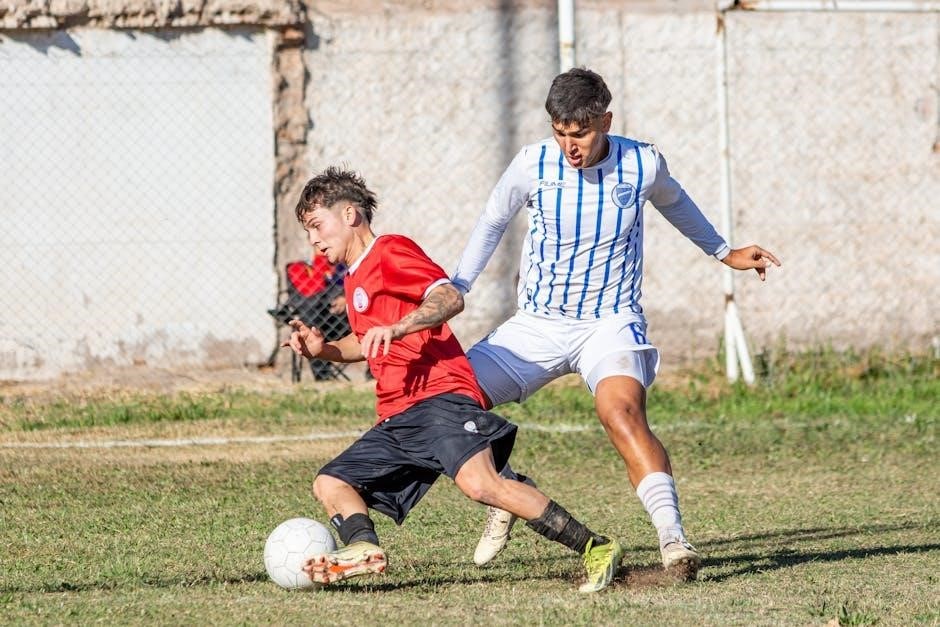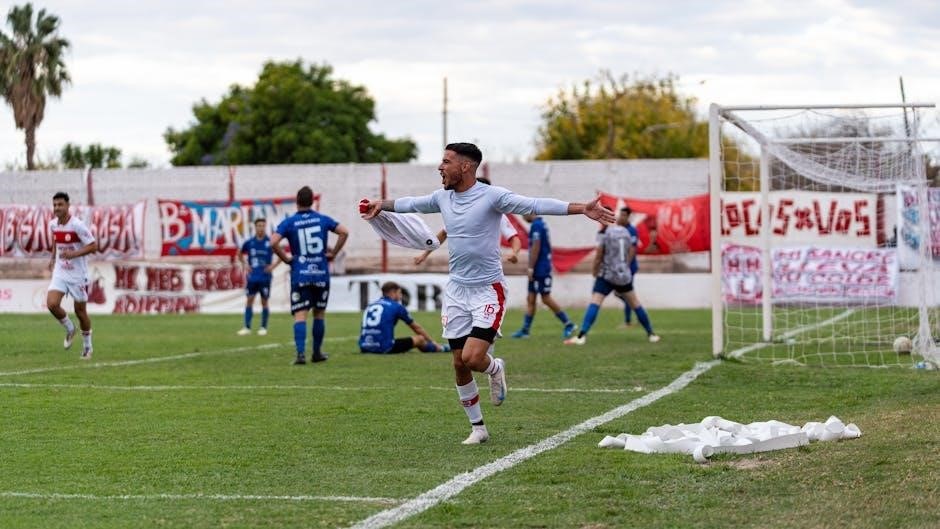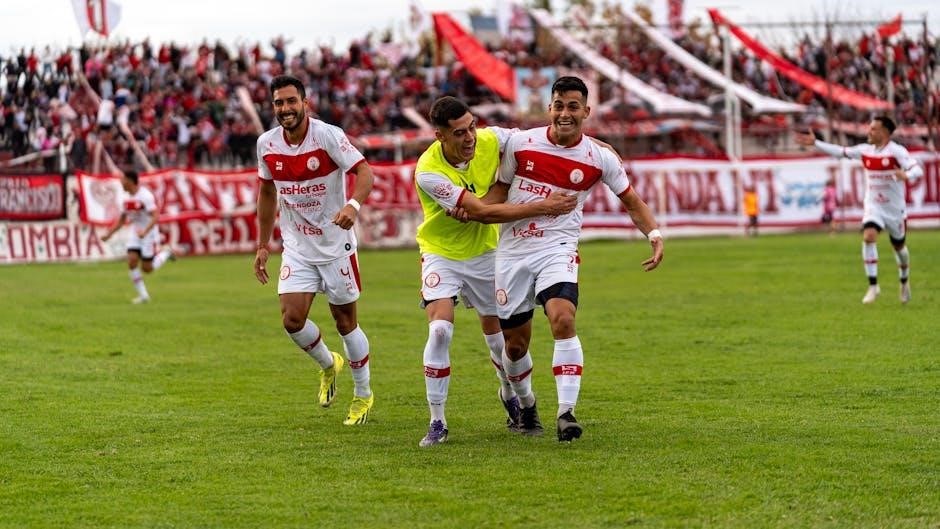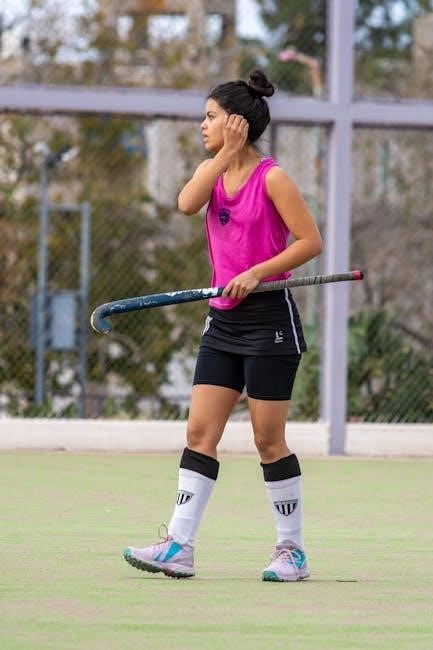The North American Computational Linguistics Open Competition (NACLO) is an annual event where students solve linguistic puzzles. It’s open to high school and middle school students without prior knowledge, free and educational.
1.1. Overview of NACLO
NACLO is an annual competition for high school and middle school students in the US and Canada, focusing on solving linguistic puzzles. It requires no prior knowledge of linguistics or second languages, making it accessible to all. The contest consists of two rounds: the Open Round, open to all participants, and the Invitational Round for top performers. The competition is free and hosted at various sites, including universities. Resources like handbooks and practice problems are available online to help participants prepare. NACLO aims to engage students in computational linguistics and language analysis, with top performers qualifying for the International Linguistics Olympiad (IOL).
1.2. Significance of the Competition
NACLO is a unique platform that introduces students to computational linguistics, fostering problem-solving and analytical thinking. It bridges academic and real-world applications, preparing participants for careers in linguistics and related fields. The competition is significant for its ability to engage students in cutting-edge linguistic challenges, encouraging them to explore language structures and computational methods; By participating, students gain valuable skills and insights, making it a pathway for those interested in pursuing higher education in linguistics or technology. The competition also serves as a stepping stone to the International Linguistics Olympiad (IOL), a prestigious global event. NACLO is free, accessible, and inclusive, making it a valuable opportunity for students across North America.

What is NACLO?
NACLO is an annual competition for students in grades 6-12, focusing on solving linguistic puzzles. No prior knowledge is required, making it accessible and engaging for all participants.
2.1. Definition and Purpose
NACLO, or the North American Computational Linguistics Open Competition, is an annual event where students solve puzzles in linguistics and computational linguistics. Designed for students in grades 6-12, it requires no prior knowledge, making it accessible to all. The competition aims to foster interest in linguistic problem-solving and computational approaches. Sponsored by the Linguistic Society of America and the North American Chapter of the Association for Computational Linguistics, NACLO provides a platform for students to engage with cutting-edge linguistic challenges. Its purpose is to encourage academic growth, critical thinking, and exploration of language structures, while also identifying top performers for international competitions like the International Linguistics Olympiad (IOL).
2.2. Eligible Participants
NACLO is open to students in grades 6-12, primarily targeting high school students. Participants must be enrolled in a U.S. or Canadian school. Younger students can join with parental consent but must register separately. The competition is free and accessible to all eligible students, regardless of their background. Students can participate at their school or a nearby university site. This inclusivity ensures that a diverse range of students can engage with linguistic challenges, fostering a broader interest in computational linguistics and related fields. The competition is designed to be welcoming to all skill levels, encouraging participation from a wide audience.
2.3. No Background Necessary
NACLO is unique in that no prior knowledge of linguistics or second languages is required. Students from diverse academic backgrounds are encouraged to participate. The competition is designed to be accessible, with problems crafted to introduce key concepts in an engaging way. Professionals in linguistics and computational linguistics create challenges that reflect real-world issues, making the event both educational and fun. This approach ensures that participants can learn and grow without needing prerequisite skills, fostering curiosity and interest in the field of computational linguistics. The emphasis is on problem-solving and logical thinking, making it inclusive for all students.
History and Evolution of NACLO
NACLO, founded in 2007 by the Linguistic Society of America, has grown into a premier event, inspiring students to explore linguistics and computational linguistics annually.
3.1. Origins of the Competition
The North American Computational Linguistics Open Competition (NACLO) was established in 2007 by the Linguistic Society of America. It was created to engage students in solving linguistic puzzles without requiring prior knowledge. The competition aimed to promote interest in linguistics and computational linguistics among high school and middle school students. NACLO has since grown into a significant annual event, attracting students from across the U.S. and Canada. Its origins reflect a commitment to making linguistics accessible and fun, with problems designed by professionals to challenge and inspire young minds.
3.2. Growth Over the Years
Since its inception, NACLO has experienced steady growth, becoming a prominent event in North America. Initially launched in 2007, the competition has expanded its reach, attracting more participants and host sites annually. The number of students competing has increased significantly, reflecting growing interest in linguistics and computational linguistics. Additionally, the event has gained recognition for its unique approach to problem-solving, making it a popular choice for high school and middle school students. The competition’s accessibility and free registration have further contributed to its growth, ensuring that students from diverse backgrounds can participate and benefit from the experience.
3.3. Notable Milestones
NACLO has achieved several notable milestones since its inception. In 2007, the first competition was held, marking the beginning of a unique academic event focused on linguistics. Over the years, NACLO has expanded its reach, with the introduction of the Invitational Round in 2010, offering a higher level of challenge. In 2012, it became the official qualifier for the International Linguistics Olympiad (IOL), further elevating its prominence. The competition has also seen growth in host sites, including major universities like Columbia University in 2024. These milestones highlight NACLO’s commitment to fostering linguistic excellence and its growing impact on students’ academic and career paths.
NACLO consists of two main rounds: the Open Round and the Invitational Round. The Open Round is open to all eligible students, while the Invitational Round is for top performers, offering advanced challenges.
4.1. Open Round Details
The Open Round of NACLO is the first stage, open to all eligible students. It typically takes place in late January, such as January 25, 2024, from 10 AM to 1 PM. Participants solve linguistic puzzles without needing prior knowledge of linguistics. The round is free and open to high school and middle school students. Students can participate at their school or a nearby university site. Registration is required by a specified deadline, such as January 23, 2024. Sample questions are available for practice, helping participants prepare for the competition format and content.

Structure of the Competition
4.2. Invitational Round
The Invitational Round is the second stage of NACLO, held in mid-March, such as March 14, 2024. It is more challenging than the Open Round and requires participants to provide detailed explanations for their answers. Only top-performing students from the Open Round qualify for this stage. The format may vary, but it typically involves solving complex linguistic puzzles within a set timeframe. The Invitational Round is often hosted at specific university sites, and the top performers may qualify for the International Linguistics Olympiad (IOL). This round showcases advanced problem-solving skills and linguistic knowledge.

Benefits of Participating in NACLO
Participating in NACLO enhances problem-solving and analytical skills, introduces students to linguistics, and offers career insights. It inspires academic and professional paths in computational linguistics and related fields, fostering growth and opportunities.
5.1. Developing Problem-Solving Skills
Participating in NACLO fosters critical thinking and analytical abilities through engaging linguistic puzzles. Students learn to approach problems methodically, enhancing their capacity to break down complex linguistic phenomena. The competition’s diverse challenges, spanning phonetics to syntax, encourage creative problem-solving and logical reasoning. These skills are transferable to academic and professional realms, preparing participants for advanced studies in linguistics, computer science, and related fields. By tackling NACLO’s unique problems, students develop a deeper understanding of language structures and computational methods, equipping them with a strong foundation for future intellectual pursuits.
5.2. Career Opportunities in Linguistics
Participating in NACLO can ignite a passion for linguistics, opening doors to diverse career paths. The competition introduces students to computational linguistics, natural language processing, and language technologies, which are in high demand. Skills honed through NACLO, such as analytical thinking and problem-solving, are highly valued in fields like artificial intelligence, data science, and language education. Many NACLO participants pursue degrees in linguistics, computer science, or cognitive science, leading to careers in research, software development, or language policy. The competition serves as a springboard for students interested in exploring the interdisciplinary nature of linguistics and its practical applications.

Preparation and Resources
NACLO offers official resources, practice problems, and study guides to help participants prepare. Workshops and training sessions are also available to enhance skills and understanding.
6.1. Official Resources and Guidelines
NACLO provides official resources, including a comprehensive student handbook and practice problems, to help participants prepare effectively. These materials are available on the NACLO website and include detailed guidelines for the competition. The student handbook offers insights into the competition format, rules, and expectations. Additionally, NACLO hosts an introduction session to familiarize participants with the event. The official website also contains links to past problems and solutions, allowing students to practice and understand the problem-solving techniques required. All resources are designed to ensure participants are well-prepared and informed about the competition process.
6.2. Sample Questions and Practice Problems
NACLO offers sample questions and practice problems to help participants prepare for the competition. These resources are available on the official NACLO website and provide insights into the types of puzzles and challenges students will face. The practice problems cover a range of linguistic topics, allowing participants to familiarize themselves with the competition format. Additionally, some hosting sites offer workshops or practice sessions to engage students and enhance their problem-solving skills. These materials are designed to be fun and educational, giving participants a head start in understanding the competition’s unique style and requirements.
6.3. Workshops and Training Sessions
Workshops and training sessions are optional but highly beneficial for NACLO participants. These sessions, often hosted by universities or schools, provide hands-on experience with linguistic puzzles and problem-solving strategies. While not mandatory, they help participants engage more deeply with the competition’s unique challenges. Some sites offer these as fun, interactive activities to extend learning beyond the competition itself. Although not all locations provide workshops, they are a valuable resource for students aiming to improve their skills and gain confidence. These sessions complement official practice materials and enhance overall preparedness for the competition.

Past NACLO Problems and Solutions
Past NACLO problems and solutions are available online, offering valuable practice and insights. These resources help students understand the competition’s style and improve their problem-solving skills effectively.
7.1. Examples of Past Questions
Past NACLO questions are available online, offering insights into the competition’s format. These questions cover a wide range of linguistic topics, from phonetics to syntax, and computational linguistics. They often involve analyzing data from diverse languages, making them engaging and educational. For instance, previous questions have focused on identifying patterns in language structures, decoding written texts, and solving puzzles related to language technology. These examples provide valuable practice for participants, helping them understand the types of challenges they may face during the competition.
7.2. Learning from Past Solutions
Reviewing past NACLO solutions provides valuable insights into problem-solving strategies. These solutions, available online, detail the thought processes and methods used by participants. By analyzing them, students can improve their critical thinking and linguistic analysis skills. Past solutions also highlight common pitfalls to avoid and offer tips for approaching complex problems. Additionally, they demonstrate how to articulate answers clearly, which is crucial for scoring well. Learning from past solutions helps participants better understand the competition’s expectations and refine their techniques for future challenges.

How to Register for NACLO
Visit the official NACLO website at www.naclo.org. Online registration is required for students aged 13-18. Younger students need parental permission and should contact NACLO directly. Registration is free and typically closes in late January. After registering, participants receive location details via email.
8.1. Registration Process
To register for NACLO, visit the official website at www.naclo;org. Complete the online registration form, providing required details such as name, school, and contact information. The deadline for registration is typically in late January. After submitting the form, participants will receive confirmation and location details via email. Students under 13 must obtain parental permission and contact NACLO directly; The process is straightforward, ensuring equal access for all eligible participants. Registration is free, making it accessible to students across North America. Be sure to review the guidelines before final submission.
8.2. Deadline and Requirements
The registration deadline for NACLO is typically in late January, with the exact date specified on the official website. Participants must be high school or middle school students aged 13-18, though younger students can join with parental consent. No prior linguistic knowledge is required. Late registrations are not accepted, so meeting the deadline is crucial. Ensure all details are accurate and permissions are secured if under 13. The competition is free, and on-time arrival is mandatory, as latecomers may not receive extra time. Adhering to these requirements ensures smooth participation in the event.
Competition Day Experience
The annual NACLO competition is a free, three-hour event starting at 10 am. Students must arrive by 9:30 am to ensure timely participation.
9.1. Schedule and Format
The NACLO competition is an annual event, typically held on a Thursday in late January. The Open Round runs from 10:00 AM to 1:00 PM, lasting three hours. Participants must arrive by 9:30 AM to receive instructions. The competition is free and open to high school and middle school students. Late arrivals are not given extra time, ensuring fairness for all participants. The event is hosted at various locations, including universities and high schools. Practice problems are available online to help students prepare. No prior workshops are required, though some sites may offer optional training sessions.
9.2. Location and Hosting Sites
NACLO competitions are held at various locations across the U.S. and Canada, including universities, colleges, and high schools. Columbia University, for example, hosts the event at its Morningside Heights campus, with the exact venue communicated to participants via email. Other local sites may also offer the competition, providing convenience for participants. Students can compete at their own schools or nearby universities, ensuring accessibility. The choice of location aims to accommodate participants geographically, making the competition widely accessible to students across North America.
9.3. Rules and Instructions
NACLO competitions begin promptly, with participants expected to arrive by 9:30 AM. Late arrivals are not given extra time, and instructions are read only once. Students must bring valid identification and no unauthorized materials. The competition is proctored, and rules are strictly enforced to ensure fairness. Participants are required to read, understand, and adhere to all guidelines provided in the student handbook. Instructions are clear, and any violations may result in disqualification. The event emphasizes academic integrity, ensuring a fair and engaging experience for all participants. Detailed rules are available in the official NACLO handbook and on their website.

The Invitational Round
The Invitational Round is for top-performing students from the Open Round, offering more challenging problems. It determines qualifiers for the International Linguistics Olympiad.
10.1. Qualification Criteria
Qualification for the Invitational Round is based on high performance in the Open Round. Top scorers, typically around 50-60 students, are selected to participate. The exact number may vary annually, depending on performance distribution. Students must demonstrate exceptional problem-solving skills and deep linguistic insights. The cutoff score is determined by the organizers each year, ensuring only the most adept competitors advance. This round serves as a gateway to the International Linguistics Olympiad (IOL), making it a critical step for aspiring Olympiad participants.
10.2. Format and Challenges
The Invitational Round of NACLO presents a more challenging format, requiring participants to solve complex linguistic problems within a set timeframe. Unlike the Open Round, it demands not only correct answers but also detailed written explanations, showcasing analytical thinking. Students face tougher puzzles that delve deeper into linguistic theory and computational methods. The competition format includes a limited number of questions, each requiring rigorous problem-solving skills and linguistic knowledge. This round serves as a stepping stone for the International Linguistics Olympiad (IOL), making it a critical test of aptitude and preparedness for higher-level competitions.

Selection for the International Linguistics Olympiad (IOL)
Top performers in NACLO’s Invitational Round qualify for the IOL, representing their country in a prestigious international competition. This selection highlights linguistic excellence and problem-solving skills.
11.1. Eligibility and Selection Process
Eligibility for the International Linguistics Olympiad (IOL) is based on performance in NACLO’s Invitational Round. Students in grades 9-12 who excel in the second round are selected. The top scorers are chosen to represent their country at IOL, with a focus on linguistic aptitude and problem-solving skills. The selection process is rigorous, ensuring only the highest performers advance. This opportunity allows students to compete globally, showcasing their talents in linguistics and computational linguistics.
11.2. Preparation for IOL
Preparation for the International Linguistics Olympiad (IOL) involves advanced training and practice. Selected students receive access to specialized resources, including past IOL problems and solutions. They focus on refining skills in linguistic analysis, logical reasoning, and problem-solving under time constraints. The official NACLO handbook and practice materials are essential tools. Additionally, workshops and mentorship programs are often available to help participants adapt to the IOL format. Emphasis is placed on understanding diverse linguistic structures and computational methods, ensuring students are well-equipped to tackle the challenging problems at the international level.

Results and Awards
Results are announced after both rounds, with top performers recognized. Awards include certificates, medals, and scholarships. High achievers may qualify for international competitions like the IOL;
12.1. Announcement of Results
Results are typically announced a few weeks after each round. For the Open Round, results are usually shared in early March, while Invitational Round results follow later. Participants receive an email with their scores, rankings, and qualification status. High scorers are notified about their eligibility for the International Linguistics Olympiad (IOL). Certificates of participation are awarded to all, with special recognition for top performers. Results are also posted on the official NACLO website, ensuring transparency and accessibility for all participants and their schools.
12.2. Awards and Recognition
Top performers in NACLO receive awards and recognition for their exceptional problem-solving skills in linguistics. Medals, certificates, and special mentions are awarded to high scorers. Additionally, winners may qualify for scholarships or other academic recognitions. The competition also highlights the achievements of top teams and individuals on its official website, providing a platform for celebration and acknowledgment. These awards not only honor individual excellence but also inspire future participants to excel in the field of computational linguistics, fostering a community of passionate learners and problem-solvers.
12.3; Next Steps for Winners
Top performers in NACLO qualify for the International Linguistics Olympiad (IOL), a prestigious global competition. Winners also gain access to exclusive mentorship programs and linguistic resources. They are often recognized by academic institutions, opening doors to scholarships and advanced opportunities. Participation in NACLO is highlighted on winners’ academic profiles, enhancing their college applications and career prospects in linguistics and related fields. Winners are encouraged to share their experiences, inspiring others to explore computational linguistics. The competition fosters a pathway for talented students to excel academically and professionally in this dynamic field.
NACLO is a unique and inspiring competition that fosters linguistic and computational skills. It offers students a pathway to academic and professional growth in linguistics and related fields.
13.1. Final Thoughts
NACLO is a transformative experience that challenges students to explore the fascinating world of linguistics and computational thinking. By participating, students develop problem-solving skills, gain insights into language structures, and discover new academic and career opportunities. The competition is a stepping stone for those passionate about linguistics, offering a pathway to the International Linguistics Olympiad; NACLO’s inclusive nature ensures that students of all backgrounds can participate, making it a unique and rewarding experience. It’s a celebration of linguistic diversity and intellectual curiosity, inspiring the next generation of scholars and professionals in the field.
13.2. Encouragement for Future Participants
If you’re considering participating in NACLO, don’t hesitate—it’s an incredible opportunity to explore your passion for language and problem-solving. No prior experience is needed, making it accessible to everyone. The competition offers a chance to challenge yourself, learn from experts, and connect with like-minded students. Embrace the experience, as it not only sharpens your skills but also opens doors to new academic and career paths. Whether you’re curious about linguistics or eager to test your abilities, NACLO is a rewarding journey that can inspire and empower you. Take the leap and join this unique adventure!




